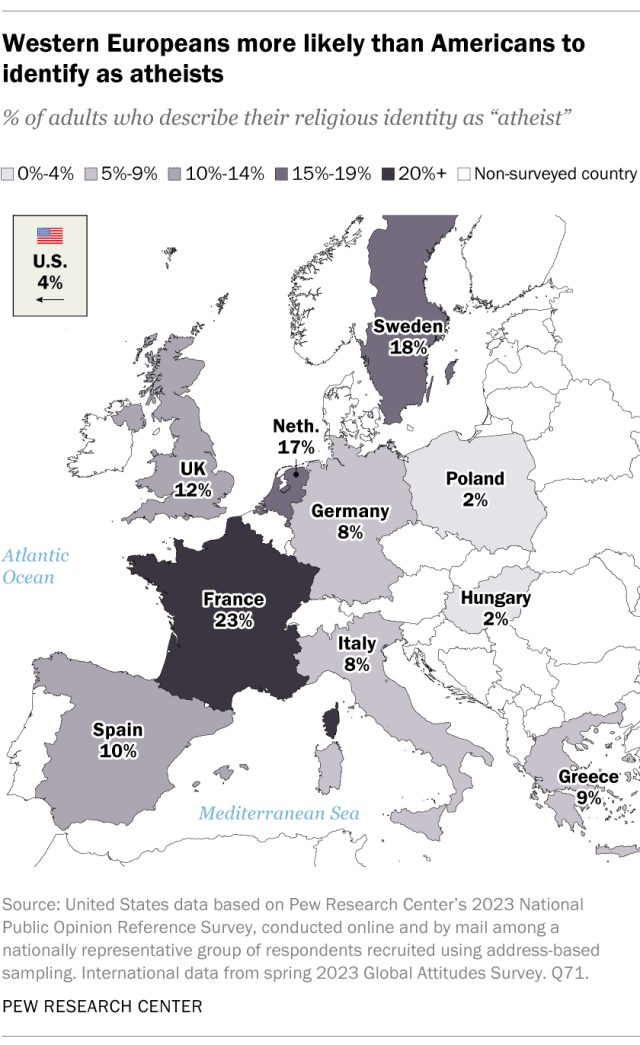
Atheists make up 4% of U.S. adults, according to our 2023 National Public Opinion Reference Survey. That compares with 3% who described themselves as atheists in 2014 and 2% who did so in 2007.
Here are some key facts about atheists in the United States and around the world, based on several Pew Research Center surveys.
This analysis draws on several Pew Research Center studies. Data on the share of atheists in the United States is from the 2023 National Public Opinion Reference Survey, as well as the Center’s 2007 and 2014 Religious Landscape Studies.
Other data on U.S. atheists comes from various waves of the American Trends Panel, collected in September and December 2017, February 2019, September 2022, and July and August 2023.
For data from countries other than the U.S., this analysis draws on nationally representative surveys conducted in 2019, 2022 and 2023. Read more details about our international survey methodology and country-specific sample designs.
For the purposes of this analysis, “wealthy nations” are those that were classified as “high income” according to the World Bank Income Classifications.
In the U.S., atheists are mostly men and are relatively young, according to a Center survey conducted in summer 2023. Around six-in-ten U.S. atheists are men (64%). And seven-in-ten are ages 49 or younger, compared with about half of U.S. adults overall (52%).
Atheists also are more likely than the general public to be White (77% vs. 62%) and have a college degree (48% vs. 34%). Roughly eight-in-ten atheists identify with or lean toward the Democratic Party.
Almost all U.S. atheists (98%) say religion is not too or not at all important in their lives, according to the same summer 2023 survey. An identical share say that they seldom or never pray.
At the same time, 79% of American atheists say they feel a deep sense of wonder about the universe at least several times a year. And 36% feel a deep sense of spiritual peace and well-being at least that often.
U.S. atheists and religiously affiliated Americans find meaning in their lives in some of the same ways. In a 2017 survey, we asked an open-ended question about this. Like a majority of Americans, most atheists mentioned family as a source of meaning.
However, atheists (26%) were far more likely than Christians (10%) to describe their hobbies as meaningful or satisfying. Atheists were also more likely than Americans overall to describe finances and money, creative pursuits, travel, and leisure activities as meaningful. Very few atheists (4%) said they found life’s meaning in spirituality.

Atheists make up a larger share of the population in many Western European countries than in the U.S., according to a spring 2023 Center survey that included 10 European countries. For example, nearly a quarter of French adults (23%) identify as atheists, as do 18% of adults in Sweden, 17% in the Netherlands and 12% in the United Kingdom.
Most U.S. atheists express concerns about the role religion plays in society. An overwhelming majority of atheists (94%) say that the statement “religion causes division and intolerance” describes their views a great deal or a fair amount, according to our summer 2023 survey. And 91% say the same about the statement “religion encourages superstition and illogical thinking.” Nearly three-quarters (73%) say religion does more harm than good in American society.
At the same time, 41% of atheists say religion helps society by giving people meaning and purpose in their lives, and 33% say it encourages people to treat others well.
Atheists may not believe religious teachings, but they are quite informed about religion. In our 2019 religious knowledge survey, atheists were among the best-performing groups. On average, they answered about 18 out of 32 fact-based questions correctly, while U.S. adults overall got roughly 14 questions right. In particular, atheists were twice as likely as Americans overall to know that the U.S. Constitution says no religious test is necessary to hold public office.
Atheists were also at least as knowledgeable as Christians on Christianity-related questions. For example, roughly eight-in-ten in both groups knew that Easter commemorates the resurrection of Jesus.
Most Americans don’t think believing in God is necessary to be a good person, according to the summer 2023 survey. When we asked people which statement came closer to their views, 73% selected “it is possible to be moral and have good values without believing in God,” while 25% picked “it is necessary to believe in God in order to be moral and have good values.”
Adults in some other wealthy countries tend to agree with this sentiment, based on responses to a similar question we asked in 2019 and 2022. For example, nine-in-ten Swedish adults say belief in God is not necessary to be moral and have good values, while 85% in Australia, 80% in the Czech Republic and 77% in France say this.
However, fewer than one-in-ten adults in some other countries surveyed say that a person can be moral without believing in God. That includes 5% of adults in Kenya, 4% in the Philippines and 2% in Indonesia. In all three nations, more than nine-in-ten say instead that a person must believe in God to be a moral person.
About three-quarters of U.S. atheists (77%) do not believe in God or a higher power or in a spiritual force of any kind, according to our summer 2023 survey. At the same time, 23% say they do believe in a higher power of some kind, though fewer than 1% of U.S. atheists say they believe in “God as described in the Bible.”
This shows that not all self-described atheists fit the literal definition of “atheist,” which is “a person who does not believe in the existence of a god or any gods,” according to Merriam-Webster.
Note: This is an update of a post originally published on Nov. 5, 2015. It was last updated Dec. 6, 2019.


